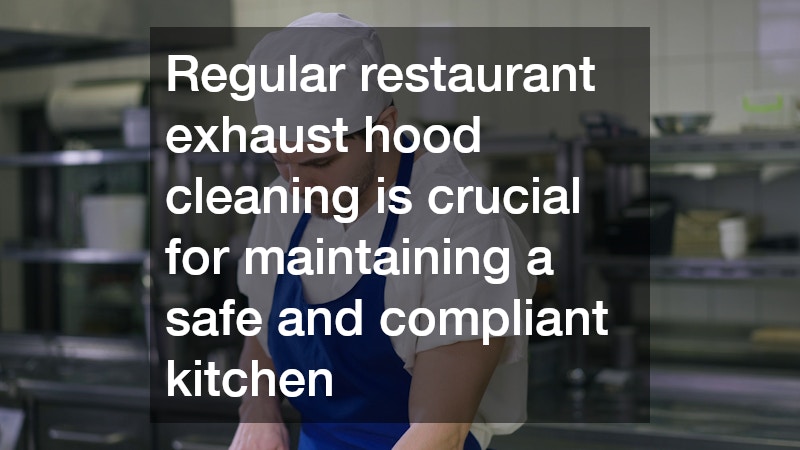Restaurant exhaust hood cleaning is an essential aspect of maintaining a safe and healthy environment in commercial kitchens. This article explores the importance of regular cleaning, addressing the most common concerns and questions surrounding the practice. By understanding the role of exhaust hood maintenance, restaurant owners and operators can take proactive steps to mitigate risks.
What are the dangers of neglecting exhaust hood cleaning?
Fire Hazards
Neglecting exhaust hood cleaning significantly heightens the risk of grease fires. Over time, grease and flammable residues accumulate in the hood and ductwork, creating a highly combustible environment.
The National Fire Protection Association (NFPA) indicates that commercial kitchen fires are often exacerbated by neglected exhaust systems.
Once a fire starts, it can quickly spread throughout the kitchen and beyond. Regular cleaning prevents these dangerous buildups, reducing the likelihood of such catastrophic events. Ensuring clean exhaust systems is a critical step in safeguarding both staff and property.
Health Risks
Poor air quality is another significant risk associated with neglected exhaust hoods. Accumulated grease and debris can harbor bacteria and mold, posing health risks to employees and patrons. According to the Centers for Disease Control and Prevention (CDC), maintaining good air quality is crucial in preventing respiratory ailments.
The presence of smoke and odors can indicate an inadequate exhaust system, often leading to uncomfortable working conditions. This can result in worker dissatisfaction and potential health complaints. Regular cleaning ensures that air flows properly, filtering out particulates and maintaining a pleasant environment.
Legal and Regulatory Compliance
Non-compliance with local and national regulations related to kitchen exhaust systems can result in hefty fines. The NFPA, along with local health departments, sets stringent standards for kitchen ventilation systems. Failure to adhere to these guidelines can lead to legal action and closure of the establishment.
Regular inspections are mandated to ensure compliance with these rules. Having a well-documented cleaning schedule demonstrates a commitment to safety and can be instrumental during audits. Employing certified cleaning professionals can further assure compliance and peace of mind.
How often should restaurant exhaust hoods be cleaned?
Inspection and Assessment Guidelines
Routine inspections are vital to determining the appropriate frequency for exhaust hood cleaning. Factors such as the type of food cooked and the volume of cooking influence cleaning schedules. For example, kitchens producing high volumes of fried foods will require more frequent inspections and cleaning.
Regular assessments enable kitchen staff to identify specific areas prone to grease buildup. This ensures that critical spots are prioritized during cleaning sessions. By relying on professional assessments, restaurant operators can maintain safety and efficiency standards.
Frequency Recommendations
The standard recommendation for exhaust hood cleaning varies based on kitchen usage. High-volume kitchens generally require monthly cleanings, while medium-volume operations can often suffice with quarterly cleanings. Low-volume establishments might only need semi-annual cleanings.
Exhaust systems in facilities such as fast-food restaurants, which experience high grease production, need more frequent attention. Conversely, establishments like coffee shops, which produce less grease, require less frequent cleaning. National Fire Protection Association (NFPA) guidelines can offer a foundational reference for establishing cleaning frequencies.
Customizing a Cleaning Schedule
Customizing a cleaning schedule requires an understanding of specific kitchen operations. Factors such as cooking methods, hours of operation, and menu offerings should be considered. Collaborating with cleaning professionals can help tailor a schedule that aligns with business needs.
A flexible cleaning plan allows for adjustments based on seasonal menu changes or special events. Establishing a partnership with a reputable cleaning service can provide the expertise needed to adapt schedules appropriately. Continually assessing the effectiveness of the schedule ensures that it remains suited to the restaurant’s requirements.
What are the benefits of regular exhaust hood cleaning?
Improved Safety
Regular cleaning of restaurant exhaust hoods significantly reduces the risk of fire and other kitchen dangers. By eliminating grease accumulation, the potential for catastrophic kitchen fires decreases considerably. This proactive measure supports a safer environment for both staff and customers.
Maintaining clean exhaust systems ensures compliance with fire safety regulations, thereby securing insurance coverage and avoiding penalties. Consistent cleaning serves as a deterrent against potential incidents that could disrupt business operations. A culture of safety within the kitchen instills confidence among employees, promoting a vigilant work atmosphere.
Enhanced Efficiency and Longevity
Regular exhaust hood cleaning translates to improved equipment performance and prolonged lifespan. Removing grease and debris allows the ventilation system to function at optimal levels. This efficiency reduction in energy consumption contributes to operational cost savings.
Well-maintained equipment is less prone to breakdowns and costly repairs. The longevity of kitchen appliances directly impacts replacement cycles, saving businesses significant expenses over time. The return on investment from regular cleaning is evident in the enhanced durability of kitchen infrastructure.
Cost Savings
Preventative exhaust hood cleaning is a key factor in reducing emergency repair expenses. Addressing issues before they escalate minimizes service disruptions that can affect revenue. Investing in regular cleaning schedules is an upfront cost with substantial long-term financial benefits.
Routine cleaning helps detect potential problems early, allowing for strategic planning of any necessary repairs. This approach avoids costly last-minute fixes and potential closures. The savings realized from preventative measures can be redirected towards other critical aspects of business growth.
Furthermore, maintaining a spotless kitchen environment enhances brand reputation and customer loyalty. Patrons often equate cleanliness with quality, making hygiene a selling point that can increase patronage. Consistent practices foster trust and encourage repeat business, contributing positively to the establishment’s bottom line.
Regular restaurant exhaust hood cleaning is crucial for maintaining a safe, efficient, and compliant kitchen. Understanding and implementing effective cleaning practices helps safeguard businesses and their patrons. By prioritizing maintenance, operators can protect their investments, ensuring the well-being of customers and employees alike.
.




